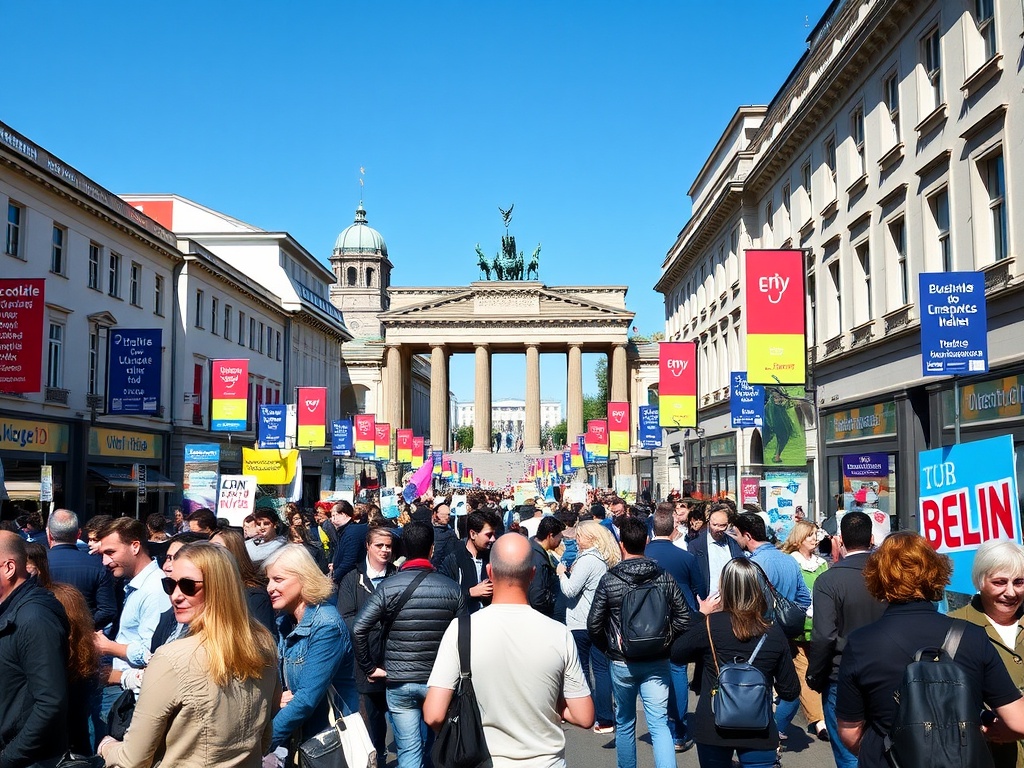As Europe’s most populous nation and a key driver of its economy, Germany exerts significant influence across the continent. However, as Germans prepare to cast their votes this Sunday, neighboring countries are particularly attentive to the election outcomes. The results could be pivotal, shaping Germany’s role in European security, its ongoing support for Ukraine, and addressing its struggling economy.
The anticipated victor is not likely to surprise anyone: the conservative Christian Democrat alliance (CDU-CSU) has consistently led in the polls for years, with its leader, Friedrich Merz, poised to become Germany’s next chancellor. Nonetheless, the path to power is less straightforward, as the CDU-CSU will require a coalition partner to secure a parliamentary majority.
Merz may opt to ally with either the socialist SPD, led by outgoing Chancellor Olaf Scholz, or the Greens, who were also part of Scholz’s coalition. However, if one or all of these parties falter in performance, it could necessitate a three-party coalition involving both the SPD and the Greens, echoing the fractious dynamics of Scholz’s previous “traffic light” coalition, which collapsed in internal conflict last November, leading to these early elections.
There is, however, a more pressing concern looming over the elections. Within German political circles and among its European allies, there is significant anxiety regarding the potential rise of the far-right, which could achieve its most substantial electoral success since the fall of the Nazi regime. Current polls suggest that the far-right Alternative for Germany (AfD) party could secure an unprecedented second place in the election, fueled by rising discontent over immigration.
The AfD’s surge has become a defining narrative of this election cycle, currently holding around 21 percent in the polls, just eight points behind the CDU-CSU at 29 percent. This rise has drawn attention from prominent figures, including tech magnate Elon Musk, who hosted a discussion with AfD co-leader Alice Weidel, and U.S. Vice President JD Vance, who met with Weidel last week in Munich. However, it remains uncertain how much this support will bolster the party, given the increasing German aversion to the Trump administration.
The question of foreign influence in German elections has emerged as a significant campaign theme, with Merz accusing the Trump team of “interfering quite openly” in the electoral process. Scholz has also had direct confrontations with Musk, who recently referred to the chancellor as “a fool” following the collapse of his coalition, while Scholz has criticized Musk for downplaying the Holocaust.
Nevertheless, Merz is not averse to adopting Trump-like populism himself. In an attempt to counter the AfD’s rising challenge, he recently pushed through contentious anti-immigration measures in the Bundestag. A long-time critic of former Chancellor Angela Merkel’s 2015 “Wir schaffen das” (We can do it) pledge to accept a million refugees, Merz has promised to tighten rules for obtaining citizenship and make it easier to revoke citizenship for foreign-born Germans convicted of serious crimes.
However, these motions were adopted with the AfD’s backing, breaking a political barrier against cooperation with extremist parties and sparking widespread protests from hundreds of thousands of citizens.
Merz’s anti-immigration strategy is widely perceived as having cost him significant support; while he currently leads by eight points in the polls, he once enjoyed a 15-point advantage last November. The implications of this election extend far beyond Germany’s borders. As Europe grapples with economic uncertainty and geopolitical instability, many are looking to Germany for decisive leadership.
- “If ever there were a moment demanding a stable Germany capable of convening and underwriting drastic European action, it is now,”
- asserts Jeremy Cliffe, a senior fellow at the European Council on Foreign Relations.
He warns that current polling trends point toward the possibility of another fragile, disunited coalition. “However, it is still just about possible to glimpse a better outcome. Over the course of the campaign, Merz has adopted a more sober and realistic view of the dangers posed by a second Trump term for Germany,” he notes.
At 69, Merz would bring a contrasting leadership style to that of the cautious and unassuming Scholz. A staunch advocate for Ukraine, he has indicated a willingness to support changes in both German and European Union regulations to facilitate increased defense spending.
Merz has also openly addressed the challenges ahead, emphasizing that Europe must be prepared to defend itself independently of the U.S. While he maintains an Atlanticist stance, like most European leaders, he is deeply concerned about Trump’s increasing alignment with Russian President Vladimir Putin’s stance on Ukraine and his questioning of NATO’s collective defense clause, which has underpinned European security for 75 years.
“We must prepare for the possibility that Donald Trump will no longer uphold NATO’s mutual defense commitment unconditionally,” he stated in a recent interview.
Merz has even raised concerns about the potential for long-term authoritarian instability in the U.S., remarking, “This is no longer the America we used to know,” following Trump’s pardoning of the January 6 rioters.
Michael Gahler, a CDU Member of the European Parliament and Vice-President of the European Parliament’s Committee on Foreign Affairs, expresses confidence in Merz’s commitment to a robust stance on Ukraine, NATO, and defense. “Unlike Scholz, he would not hesitate,” says Gahler. “He understands that we must continue providing military support to Ukraine and that Europe needs to form a coalition of willing nations to provide supply troops for any potential peace agreement.”
Domestic Challenges Awaiting the Next Chancellor

Beyond international concerns, the next chancellor will face pressing domestic challenges. Germany is experiencing its longest period of stagnation since World War II, characterized by sluggish growth, soaring energy prices, and waning competitiveness. Once regarded as Europe’s economic powerhouse, Germany now grapples with the daunting task of revitalizing its industrial base.
At the core of the economic discourse lies Germany’s evolving industrial model. For decades, the nation’s prosperity was built on three pillars: affordable Russian gas, robust exports to China, and unwavering security guarantees from the U.S. However, the collapse of these foundational supports presents a significant challenge for the incoming administration.
Merz’s economic strategy, branded as Agenda 2030, proposes corporate tax reductions, regulatory rollbacks, and cuts to welfare spending to stimulate investment. As the election approaches, the stakes could not be higher for Germany, Europe, and beyond.




